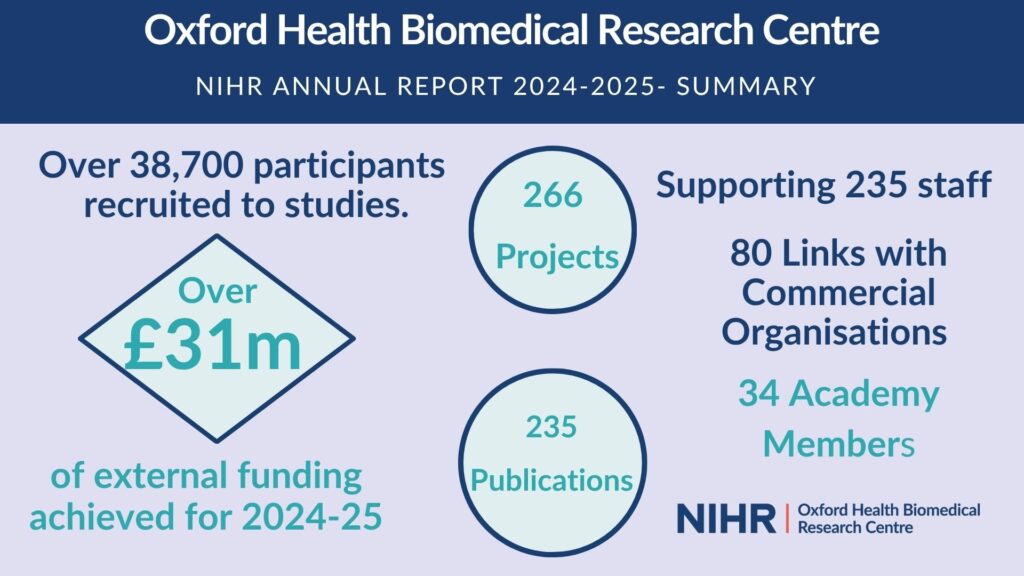It might have Oxford in the name, but the NIHR Oxford Health Biomedical Research Centre (OH BRC) reaches far beyond the city. Its national network of centres of excellence in brain and mental health research includes 15 academic and NHS collaborators across the UK, and commercial partners. This enables OH BRC to have an unusually broad research portfolio, spanning everything from the search for new molecular targets for drugs to enhancing at-home psychological therapies for dementia. And in the past year alone, over 38,000 participants were recruited to its studies.
In a health research landscape where clinical academic numbers are falling and commercial investment has moved away from neuroscience and mental health, this is what really sets OH BRC apart.
“There are other centres of mental health excellence in the world, of course,” says Rachel Upthegrove MBE, OH BRC’s director and Professor of Psychiatry at the University of Oxford. “But the strength of research in brain health and psychiatry at Oxford allows us to attract people working at the forefront of their field, and link them with NHS, academic and community partners nationwide. That scope of ambition, to work nationally to improve the health of the most complex organ in our body, is what makes us different.”
Placing patients and communities at the heart of research
A major focus for OH BRC is incorporating lived experience, patient voices and community partners into research design and delivery, in a way that builds lasting relationships and infrastructure. The centre invests heavily in skilled and professional facilitators and resources for public contributors. Those with relevant lived experiences are not just used as a sounding board for academic ideas, but actively inform and shape the questions studies ask.
“Building research around the identified needs of our public contributors is far more likely to lead to successful interventions,” explains Professor Upthegrove. “We have a national network of patient and academic partners to make sure the patient voice comes from areas where mental ill health is most often experienced, like deprived inner city populations. These are some of our most valued partnerships.”
This national network allows studies to recruit participants from areas of the country with high numbers of people experiencing severe mental illness, early psychosis or treatment-resistant depression, for example. But that doesn’t mean the people of Oxford miss out. Hosting studies centrally in Oxford ensures that people from the local community have opportunities to take part in health research studies that might otherwise be unavailable to them. The city will also soon benefit from the planned new Warneford Campus in Headington, which will have new facilities dedicated to mental health research and care.
From digital innovation to industry partnerships
The breadth of OH BRC’s partnerships is already enabling research across its 11 themes to reshape how care is delivered, supporting the NHS transformation agenda of digital, preventative care delivered in the community.
Recent examples in children’s mental health include an evaluation of a new digital parenting tool designed to prevent anxiety disorders in young children, coordinated with the WISDOM Schools Research Network. The study showed the tool led to fewer diagnoses of anxiety and was cost-effective for mental health services to use. The researchers are now working on scaling up the therapy so it can be made available to more families. For children already diagnosed with anxiety, an online parent-led Cognitive Behaviour Therapy platform, developed by Oxford Health BRC researchers, was recommended by NICE in 2023 for a UK-wide rollout across mental health services. Now, backed by a £7 million Wellcome grant, this is being adapted and tested internationally.
 “Because mental health conditions develop and recover gradually over the long term, many of our research efforts focus on preventative and digital therapies,” explains Professor Upthegrove. “So, in cases where there might be very few clinical psychologists able to deliver one-to-one therapies, we’re developing digitally enhanced psychotherapies to plug that gap. This naturally aligns our work with the NHS’s long-term transformation plans and the needs of other healthcare systems worldwide, so we’re seeing our research translated not just nationally but internationally as well.”
“Because mental health conditions develop and recover gradually over the long term, many of our research efforts focus on preventative and digital therapies,” explains Professor Upthegrove. “So, in cases where there might be very few clinical psychologists able to deliver one-to-one therapies, we’re developing digitally enhanced psychotherapies to plug that gap. This naturally aligns our work with the NHS’s long-term transformation plans and the needs of other healthcare systems worldwide, so we’re seeing our research translated not just nationally but internationally as well.”
The same infrastructure that enables OH BRC’s large-scale, people-centred studies is also catching the eye of industry partners. Increasingly, companies are coming to Professor Upthegrove’s team to test lifestyle therapies, repurposed medicines, or other innovations. For their studies, the companies often access the wider, national network of research sites created through the NIHR Mental Health Translational Research Collaboration (MH-TRC). Hosted by the OH BRC, one of the MH-TRC’s remits is to improve how mental health trials and studies are set up, governed and delivered within health and care settings, so new treatments and technologies can be developed with the people who need them the most and rolled out at pace.
“Mental health disorders benefit from medication; however, there are also other ways to intervene, including psychological treatment, digital enhanced therapies, neurostimulation and others. People just want better ways to maintain their mental health and manage ill health, and that’s what our BRC/MH-TRC responds to,” says Professor Upthegrove. “By creating research environments that are diverse and inclusive, together with the MH-TRC, we’re driving a growing interest in partnership from diverse academic and commercial organisations.”
Evidence consistently shows that NHS trusts active in clinical research deliver higher-quality, safer, and more innovative services for their patients. Through its national network and patient-centred approach, OH BRC is helping to make that the norm, not just in Oxford, but nationwide.

